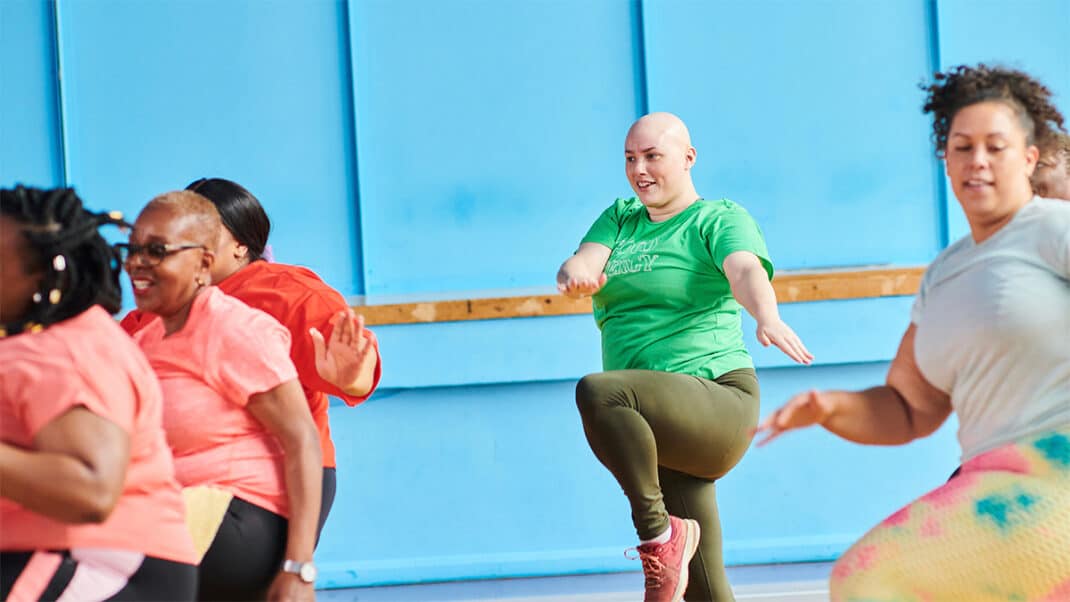Forging friendships at the gym
Gym-goers and clubs realize the rewards of fitness friendships
Denis Barry, a former champion bodybuilder, is a man on a mission: to get his fitness clients in the best shape of their lives. Through a high-intensity training program called Power Hit at Edge gym in New York City, he sends clients new workouts every week via e-mail, cracks the whip during workouts and administers weekly and monthly tests — a series of timed drills including dead lifts and bench presses — to chart their progress and make sure they aren't slacking off.
The program is so grueling that participants have started bonding together in solidarity, planning to work out together and cheering each other on during the tests. "With all the stress and grind of going through it, a lot of us became friends," says John Grosner, a hedge fund administrator. "They put us through the ringer, so it's pretty easy to vent." That venting — and other socializing — now takes place outside the gym, too. Grosner and some of the guys get together for drinks, to watch football or to go to Yankees games.
Barry never intended to be a party planner. But like more and more trainers, gym owners and exercisers themselves, he's realizing the benefits of fitness friendships. He's even added a message board to his Web site so members can share training tips.
"In the beginning, if you would have told me people would become friends, I would have been aghast," says Barry, who is a co-owner of the gym. "We're not about trying to make friends. We're about performance. Now I find that they're getting together in bars and complaining about me. But they're also doing better on the tests. The group thing, the commonality, is really helping people train harder."
It's long been an inside joke in the fitness industry that it's better to sign up new members and never see them again than to have them use the facilities faithfully. But of course, those members don't renew their memberships either, and clubs are finding that creating a social atmosphere keeps members coming back. They also stay more fit.
Beyond weights and cardio
A survey earlier this year by the Boston-based International Health, Racquet and Sportsclub Association, which represents gyms across the country, found that 18 percent of member clubs now offer "social programming," ranging from fitness classes that bring together new moms or seniors to marathon training programs to wine tasting and weekend ski trips.
"Increasingly the social atmosphere of a club is what drives business," says Sandy Coffman, an industry lecturer and consultant in Bradenton, Fla., and author of "Successful Programs for Fitness and Health Clubs." "People don't quit clubs because they've got too many friends. People will quit clubs if they're exercising on a lonely basis and they're not having a good time."
Coffman says facilities that successfully create a "club within a club" can give members a sense of community and support that helps them stick to a program.
Step aerobics, circuit training and other group exercise classes are an obvious way to bring people together. But some clubs are taking things further, offering social hours, small-group personal training and even using a buddy referral system to bring two members together to work out, she says.
Atlantic Coast Athletic Clubs in Virginia offer holiday parties, book clubs, new-member socials and monthly "coffee talks," in which a nurse speaks to a group about health issues. "Most of it falls under the wellness category," says general manager John Greene. "That encompasses a lot of things." He believes members enjoy having a variety of things to do at the club besides weights and cardio.
At The Sportsclub/LA, a chain of high-end clubs featuring restaurants, spas and child care services, some members stay all day, says president and co-founder Nanette Pattee Francini.
Partner perks
Ultimately, gyms do better when their members come back, and so do the members.
Carolyn Nurnberg, a publicist in New York, says a woman she befriended while on the elliptical trainer is now her regular workout partner. They motivate each other to meet up at the gym at the crack of dawn every morning.
Nurnberg says they also encourage each other to try new activities rather than just sticking with the elliptical. "We've really inspired each other to step out of what's most comfortable to us," she says. Sometimes they socialize outside of the gym, too.
Grosner says the friends he's made at Edge are taking his fitness to levels he wouldn't have achieved alone. "Through the competitive spirit, you push yourself," he says. "It's also nice to have a core group of people who are interested in working out as hard as I am."
Kelly McGonigal, a psychologist at Stanford University who teaches yoga and group fitness, wrote an article earlier this year in the IDEA Fitness Journal, a trade publication, urging fitness instructors to promote social connections with their clients.
She says the benefits of fitness friendships are many. "Social connection amplifies the health benefits of exercise," she says. "It strengthens the immune system, protects the cardiovascular system, improves mood and makes you more resilient to stress. Social connection boosts motivation to work out and makes the experience more fun."
Sometimes it even makes a love connection.
Susan James Carr, a public health nurse in Glendale, Calif., met her husband while playing in a round robin tennis group at her health club.
"Not only did Jim's incredibly accurate drop shot catch my attention," she says of the love match, "but his beautiful blue eyes and great smile were hard to ignore."
That was in 1985 and they're still exercising together.





